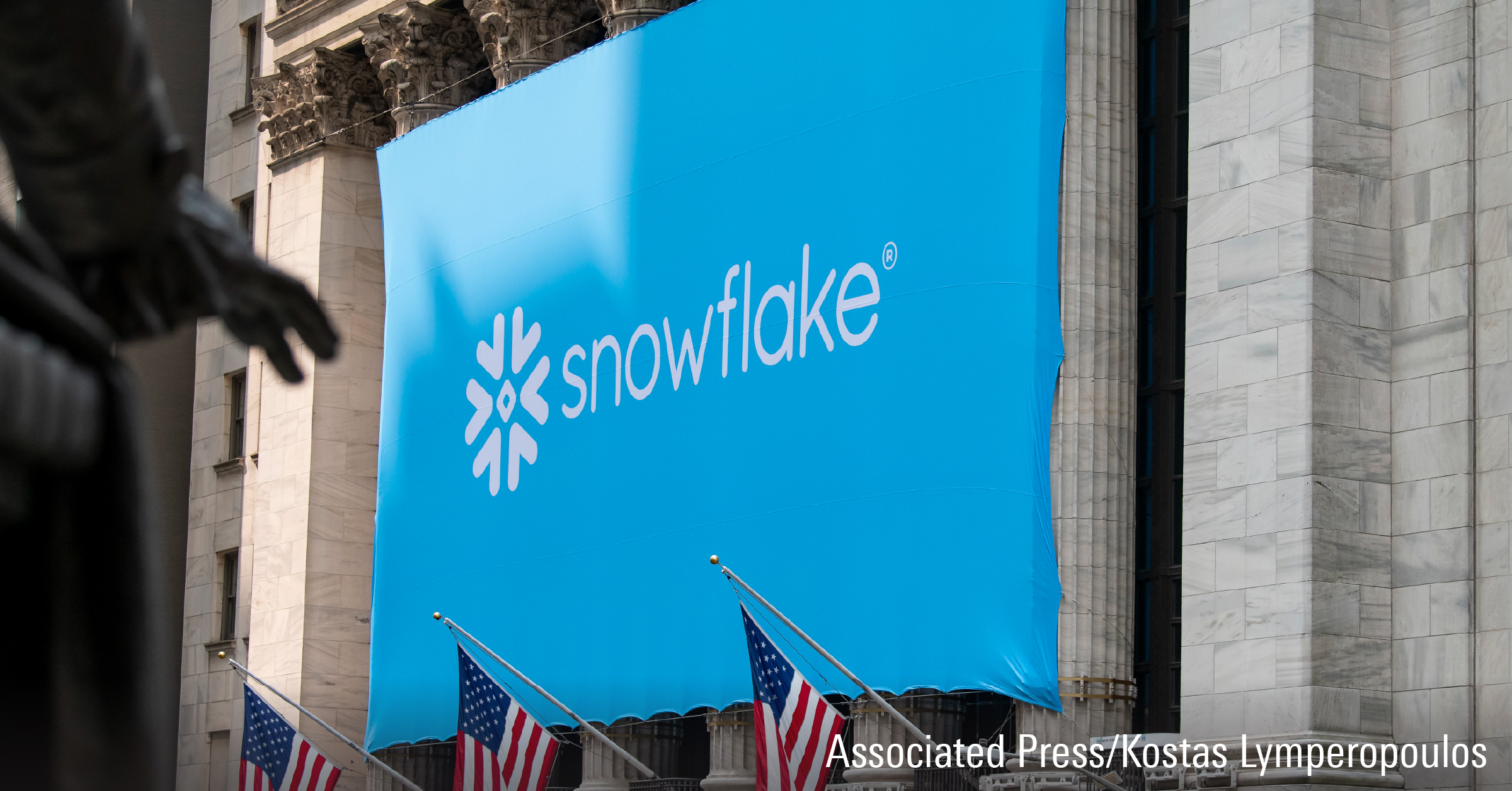After Earnings, Is Snowflake Stock a Buy, a Sell, or Fairly Valued?
With demand for DBMS software changing, here’s what we think of Snowflake stock.

Snowflake SNOW released its second-quarter earnings report on Aug. 21. Here’s Morningstar’s take on Snowflake’s earnings and stock.
Key Morningstar Metrics for Snowflake
- Fair Value Estimate: $187.00
- Morningstar Rating: 4 stars
- Morningstar Economic Moat Rating: None
- Morningstar Uncertainty Rating: Very High
What We Thought of Snowflake’s Q2 Earnings
- Snowflake had a solid quarter. While there’s concern that near-term consumption weakness will have significant lasting effects, we believe the contrary, as we see demand for DBMS software not fading, just being pushed out.
- We think Snowflake’s base of customers’ workloads will continue to mature, and combined with significant switching costs, this will lead to less volatile consumption revenue trends in future weaker macroeconomic times.
- The company’s net revenue retention rate remains very healthy.
Snowflake Stock Price
Fair Value Estimate for Snowflake
With its 4-star rating, we believe Snowflake’s stock is undervalued compared with our long-term fair value estimate of $187 per share. Our valuation implies a forward fiscal-year enterprise value/sales of 17 times. Our fair value assumptions are based on our expectations for Snowflake achieving a compound annual growth rate over the next five years of 23% and a 10-year CAGR of 21%.
The firm is in its infancy, but it has a massive market opportunity and a large runway for growth. This substantial growth is driven by workloads continually shifting to cloud environments—the use case Snowflake caters to—letting it accumulate more share of the overall database management system market. Our forecasts also assume substantial usage growth per customer, as we expect customers to scale their data storage significantly after migrating to the cloud, due to reduced costs and the ease of such scaling.
Read more about Snowflake’s fair value estimate.
Snowflake Stock vs. Morningstar Fair Value Estimate
Economic Moat Rating
We do not assign Snowflake an economic moat. We think the firm benefits from switching costs and a network effect, protected by its unique multi-cloud strategies throughout its data lake, data warehousing, and data sharing offerings. However, we cannot say with complete certainty that these advantages will lead to excess returns on invested capital 10 years from now, given Snowflake’s limited history as a public company as well as its significant current lack of profitability.
Snowflake is a fast-growing provider of data lake, data warehousing, and data sharing solutions. The company’s value proposition lies in overturning the faults of existing data storage architectures and even more recent methods of storing data in the cloud through its combined data lake and data warehouse platform. Traditionally, data has been recorded in and accessed via databases, such as the Oracle database or SAP’s HANA. However, the rise of the public cloud has resulted in an increasing need to access data from different databases in one place. A data warehouse serves this need.
Read more about Snowflake’s economic moat.
Financial Strength
We believe Snowflake is financially stable, as we are confident it will generate positive free cash flow in the long term. The firm had cash and cash equivalents and investments of $3.8 billion at the end of fiscal 2024, with zero debt on its balance sheet. Undergoing its IPO in the 2020 calendar year, Snowflake raised over $3 billion. We think this cash will be an ample buffer for the company to keep its cash and cash equivalents positive without taking on debt over the next 10 years. We model only moderate acquisitions in our explicit 10-year forecast, as we think Snowflake will focus primarily on in-house R&D and investment.
Read more about Snowflake’s financial strength.
Risk and Uncertainty
Snowflake runs the risk that other cloud-neutral software will enter its market, or that a public cloud company will make its data warehouse interoperable outside its cloud. While we think it’s unlikely that either AWS or Azure will open their ecosystems to compete with Snowflake, these two tech titans have vastly greater resources to compete in this space if they choose to.
Furthermore, Snowflake is at risk of compromising the data on its platform, either through breaches or the inability of compliance tools to do their job. For example, the firm offers several features to ensure data is compliant with regulations such as GDPR. However, if any of these tools were to fail, the company’s brand could suffer, possibly diminishing future business.
Read more about Snowflake’s risk and uncertainty.
SNOW Bulls Say
- Snowflake could remain the only multi-cloud offering of its kind for much longer than anticipated, allowing it to increase its top line more with minimal pricing pressure.
- Snowflake could move to a subscription model from a usage-based model, boosting the monetization of its products.
- Snowflake could expand to other multi-cloud data needs, pushing spending per customer to greater heights.
SNOW Bears Say
- Other multi-cloud data providers may emerge to compete with Snowflake, or in-house data warehouses at AWS or Azure could potentially adopt a multi-cloud strategy.
- Snowflake could fail to expand its data-sharing network extensively, leaving it vulnerable to competition with larger networks.
- Migration of existing workloads to the cloud could occur at a slower pace, extending Snowflake’s unprofitable years.
This article was compiled by Renee Kaplan.
The author or authors do not own shares in any securities mentioned in this article. Find out about Morningstar’s editorial policies.

/s3.amazonaws.com/arc-authors/morningstar/f497c984-8e67-4c32-8c6c-210934e57017.jpg)
/cloudfront-us-east-1.images.arcpublishing.com/morningstar/CFV2L6HSW5DHTFGCNEH2GCH42U.jpg)
/cloudfront-us-east-1.images.arcpublishing.com/morningstar/7AHOQA64TFEQDMYMIMM6VUHYLY.png)
/cloudfront-us-east-1.images.arcpublishing.com/morningstar/JA7LQ2INFNFTZFBJLSDUZGIPJQ.png)
:quality(80)/s3.amazonaws.com/arc-authors/morningstar/f497c984-8e67-4c32-8c6c-210934e57017.jpg)